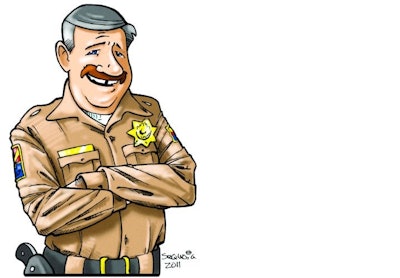 Illustration: Sequoia Blankenship
Illustration: Sequoia Blankenship
We hardened crime fighters like to think we are pretty tough cookies and, by and large, I believe we are, but I am always looking for something to give us an additional edge. So I want to share a little concept out of the University of Missouri that may just give you an intellectual advantage in the next serious pucker factor event you face.
It's called the McGuire-Ivey-Lattner Model of Mental Toughness, and coaches are using it to focus their athletes and build their mental skills. It is presented as a simple pyramid composed of various aspects of mental fortitude, and I hope you are already doing a lot of the exercises described in this program to develop these skills.
The good doctors at the Missouri Institute for Positive Coaching start with "Motivation" along the foundational base of the pyramid, and as I read about it I thought of how we need to spend more time reminding ourselves why we do what we do. It should come from an intrinsic drive because we enjoy what we do and believe in our mission. Our motive should be internal; we should want to continually become better at our jobs and not need others to drive us. Our approach to every situation should be positive, expecting to win, not just to get through it and survive.
The next level in the pyramid is "Preparation" and reminds us of the philosophy of all aspects of police training: physical, technical, tactical, and mental. For us, this requires an emphasis on job-specific training and mental perseverance in the face of adversity, which is very similar to athletics. After all, what is an athlete doing other than performing a skill in a stressful environment?
The next level of the pyramid is "Focus," and this is a critical one in law enforcement training. Since focus is a complex issue it is broken down into five components: Time orientation—being in the now, pushing other thoughts and distractions aside; Positive Self-Talk—remember, the most important conversation you have may be with yourself; Composure—developed by using tools like tactical breathing to keep your head when others around you are losing theirs; Concentration—Missouri's motto on focusing is "See it…Feel it…Trust it!" "Trusting it" means you believe in yourself and your preparation and this leads to...Confidence—the good doctors believe confidence is a thought, one we can choose, so they teach their athletes to always choose to be confident.
To test if a player has done his or her prep for "Focus" a coach will ask, "Where are you?" and the correct response is, "Right here, right now!" This is a pretty good test to check if you are in "condition yellow," the mindset that law enforcement officers need to be in on the street.
Tier 4 of the pyramid is "Emotional Stability," and it is divided into four categories: Flexibility, the ability to draw from a range of positive emotions in a variety of critical situations; Responsiveness, the ability to be "dialed in" in every situation; Strength, the ability to cope with emotional, mental, and/or spiritual pain, a skill we need to focus a great deal more on in law enforcement; and finally, Resilience, the ability to bounce back and recover from a blow. We are never going to avoid trauma in our profession, but too often we don't proactively prepare for it. Preparation is the key to strength and resilience.
We are getting near the top of this mental toughness pyramid now and it should be no shock that "Accountability" is shown as the skill of penultimate importance for us. We need to be accountable to ourselves, to always keep striving toward our goals and constantly building good habits and avoiding bad ones. This simply involves choosing to do what is expected of us, not only by others but by ourselves.
Finally, we come to the top of the pyramid and the point of all training: "Performance." What we do when we need to do it is the ultimate measure of our preparation. OK, here is your homework: Review this pyramid in your mind, practice the mental rehearsals and tactical breathing skills that are so valuable, and make sure you always win.
Dave Smith is an internationally recognized law enforcement trainer and is the creator of "JD Buck Savage." You can follow Buck on Twitter at @thebucksavage.
















